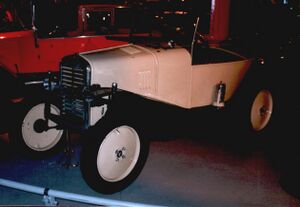Engineering:Lafitte (automobile)
Lafitte was a French automobile manufactured in Paris from 1923–1928. The 'SA de Construction de Voiturettes Th. Lafitte', owned by Theodore Laffitte, manufactured a light cyclecar which was renowned for its innovative engineering. It incorporated a three-cylinder radial engine mounted in a hinged cage, which was tilted by the driver to engage and vary the ratio of the friction drive to the rear wheels. Uniquely, the 'variable ratio' friction drive consisted of a convex steel flywheel and a concave 'clutch plate' that was faced by wound strips of paper or sometimes leather. [1][2]
History

Lafitte began constructing automobiles in Paris in 1923 on The Quai. In 1926 they started using the manufacturing facility in Courbevoie, of the defunct Doriot, Flandrin & Parant. In 1928 it ceased production.[1]
Models
The Lafitte was an unconventional car. It was powered by 22 hp 3 cylinder radial engine of 736cc capacity, which was enlarged to 895cc in 1928, its final year.[1] The engine was mounted in a hinged cage, which was tilted by the driver to engage and vary the ratio of the friction drive to the rear wheels. Uniquely, the 'variable ratio' friction drive consisted of a convex steel flywheel and a concave 'clutch plate' that was faced by wound strips of paper or sometimes leather.[1][2] The new price in England was 100 pounds sterling.[3]
In 1928, a sports version with a 25 hp, 895cc engine topped the range. The maximum speed was quoted as 96 kilometres per hour (60 mph).[3]
Review
It was described by Bill Boddy, editor of Motor Sport as :[4]
"The kind of thing that only an inebriated person staggering along the Strand clutching £100 in his hand, would have bought new.
Literature
- Harald H. Linz, Halwart Schrader : The International Automobile Encyclopedia . United Soft Media Verlag, Munich 2008, ISBN 978-3-8032-9876-8 .
- George Nick Georgano (Chefredakteur): The Beaulieu Encyclopedia of the Automobile. Volume 2: G–O. Fitzroy Dearborn Publishers, Chicago 2001, ISBN 1-57958-293-1. (english)
- George Nick Georgano: Autos. Encyclopédie complète. 1885 à nos jours. Courtille, Paris 1975. (french)
References
- ↑ 1.0 1.1 1.2 1.3 The Complete Encyclopedia of the Motorcars - 1885 to the present. Edited by G.N.Georgano, Published 1973 by Ebury Press, London
- ↑ 2.0 2.1 USA Patent Application, 1914, Theodore Lafitte
- ↑ 3.0 3.1 George Nick Georgano : The Beaulieu Encyclopedia of the Automobile. Volume 2: G–O. Fitzroy Dearborn Publishers, Chicago 2001, ISBN 1-57958-293-1.
- ↑ Motor Sport Magazine, Page 58, May 1989, Veteran to classic - Lightweights in Wales
External links
- Motor Sport Magazine, May 1989, Veteran to classic - Lightweights in Wales. Page 480.[1]
- WSCC (Westfield Sports Car Club), Newsletter, September 26, 2016. CVT from 1928 at Kop Hill, by 'Man On The Clapham Omnibus'[2]
 |


